Major Fraud Case: Almaty Trial Targets Group Accused of Taking Homes from 30 Families
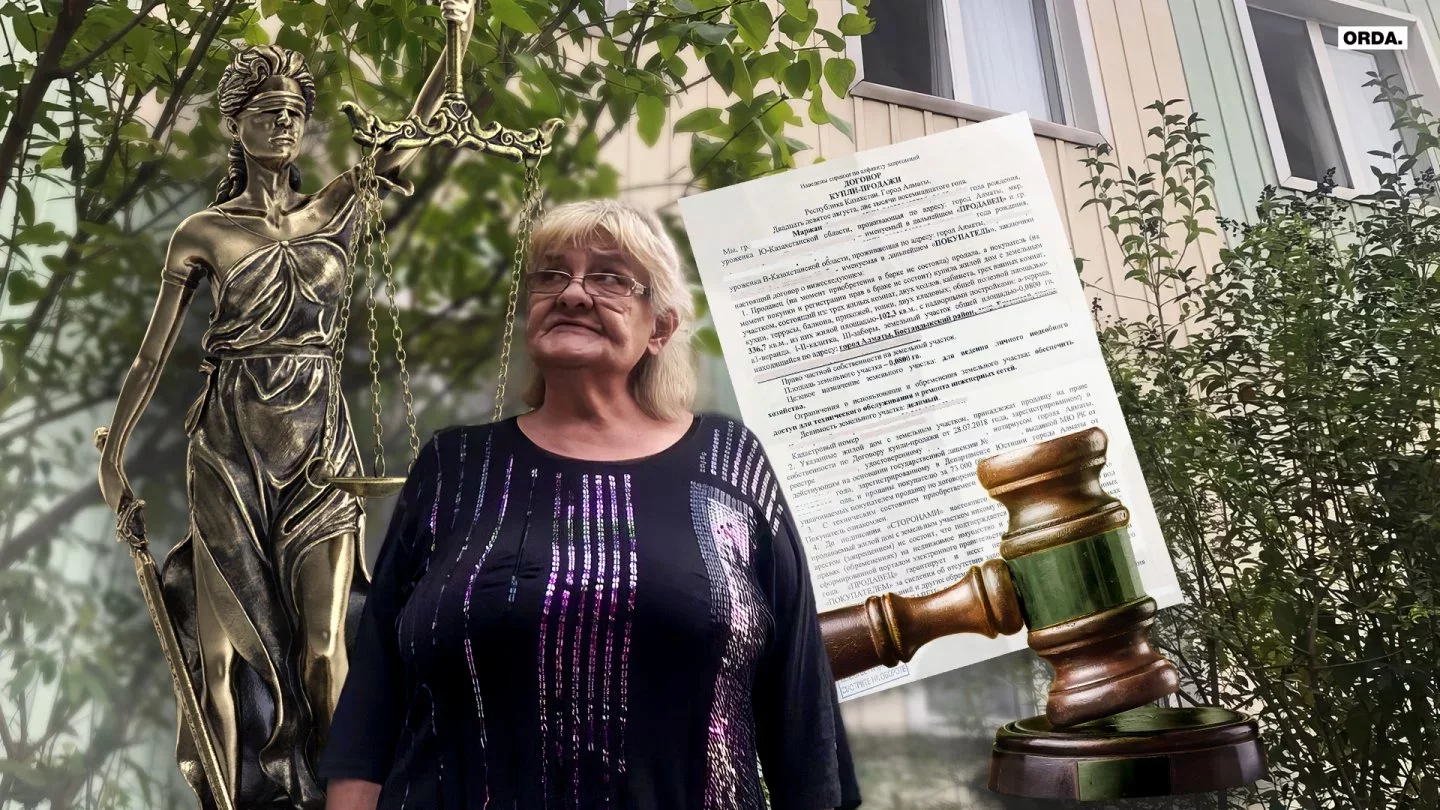 Photo: Orda.kz
Photo: Orda.kz
A trial is now underway in Almaty involving people accused of taking property and money from 30 families. Eight people are on the defendants’ bench, while the ninth lives in the Emirates and has still not been extradited to Kazakhstan.
The victims fought for five years to get the case to court, and now doubt they will receive a fair verdict or get their homes back.
A journalist from Orda.kz looked into the situation.
How It All Began
More than 30 entrepreneurs from Almaty lost their homes and businesses after borrowing money at interest not from banks, but from loan sharks. After years of waiting, only half of the victims made it to court; the rest gave up and stopped fighting.
It all began when these women needed money. Some needed it to expand their businesses, others for personal needs. They applied to banks, filled out personal information, and later received phone calls. The voice on the phone said they were a manager from an MFO and offered to issue a loan.
I was happy that the MFO approved the loan, and I signed a standard contract with them. The terms were as follows: every month I repaid a set amount with interest, and by the end of the sixth month I would close out the loan completely, says the victim Nazira.
She paid on time but was unable to repay the full loan within six months. Then the manager told her that her apartment, which was held as collateral, would be sold any day.
In reality, the loan term could have been extended, and the MFO did not engage in selling property.
But Nazira didn’t know this and believed them.
I panicked. I was afraid of losing my home. So when the manager offered me a ‘solution,’ I grabbed the chance, the woman explains.
The “solution” was to borrow money from a loan shark, close the loan, and release her apartment from collateral. Then she would repay the new loan later, even though the interest rate was very high.
Another woman, Irina Antropova, shared her story. Her situation was slightly different. Irina had overdue payments on a bank loan. Her property was used as collateral. When she received a call from the bank threatening to sell her home, she was frightened but didn’t panic.
Then two women came to her home. They suggested borrowing money at interest from their acquaintance, a loan shark. Irina refused, but one of the women was persistent and kept visiting her for another six months.
During that time, we became friends. She cared for me, brought jars of pickled vegetables. I trusted her and agreed, Irina says.
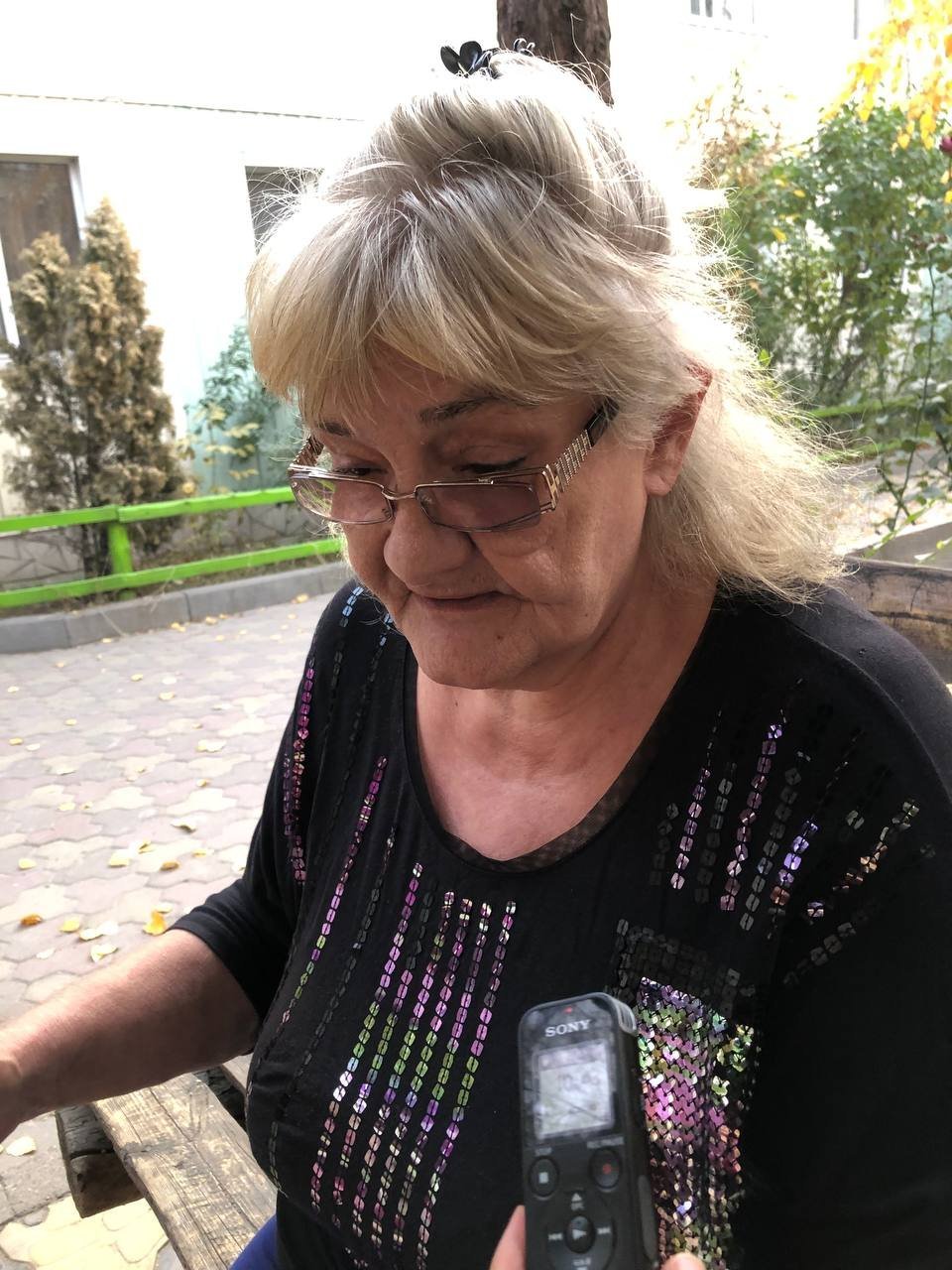
The third victim, Marzhan, already had bank loans, but her business needed additional funds.
She also applied for loans at banks and MFOs and received a call from the same person who contacted Nazira.
I believe there was a leak of our personal data. Third parties gained access to it, says Marzhan.
That’s when the loan sharks got involved. Two of them are now on trial — Rita Uteuova and Sergey Denisov. A third, Adlet Rakhimzhanov, is a suspect but has not yet been tried.
The remaining six defendants are intermediaries and relatives of Denisov, in whose names the victims’ property was registered.
How Did They Lose Their Money and property?
The loan sharks gave us money at interest, but of course they demanded guarantees that we would repay it. The guarantee they proposed was to sign a purchase agreement for our property. As if we were selling our apartments for their full market value and signing a receipt saying we received the money. The notary assured us that this agreement had no real legal force, and we believed it, explains Marzhan.
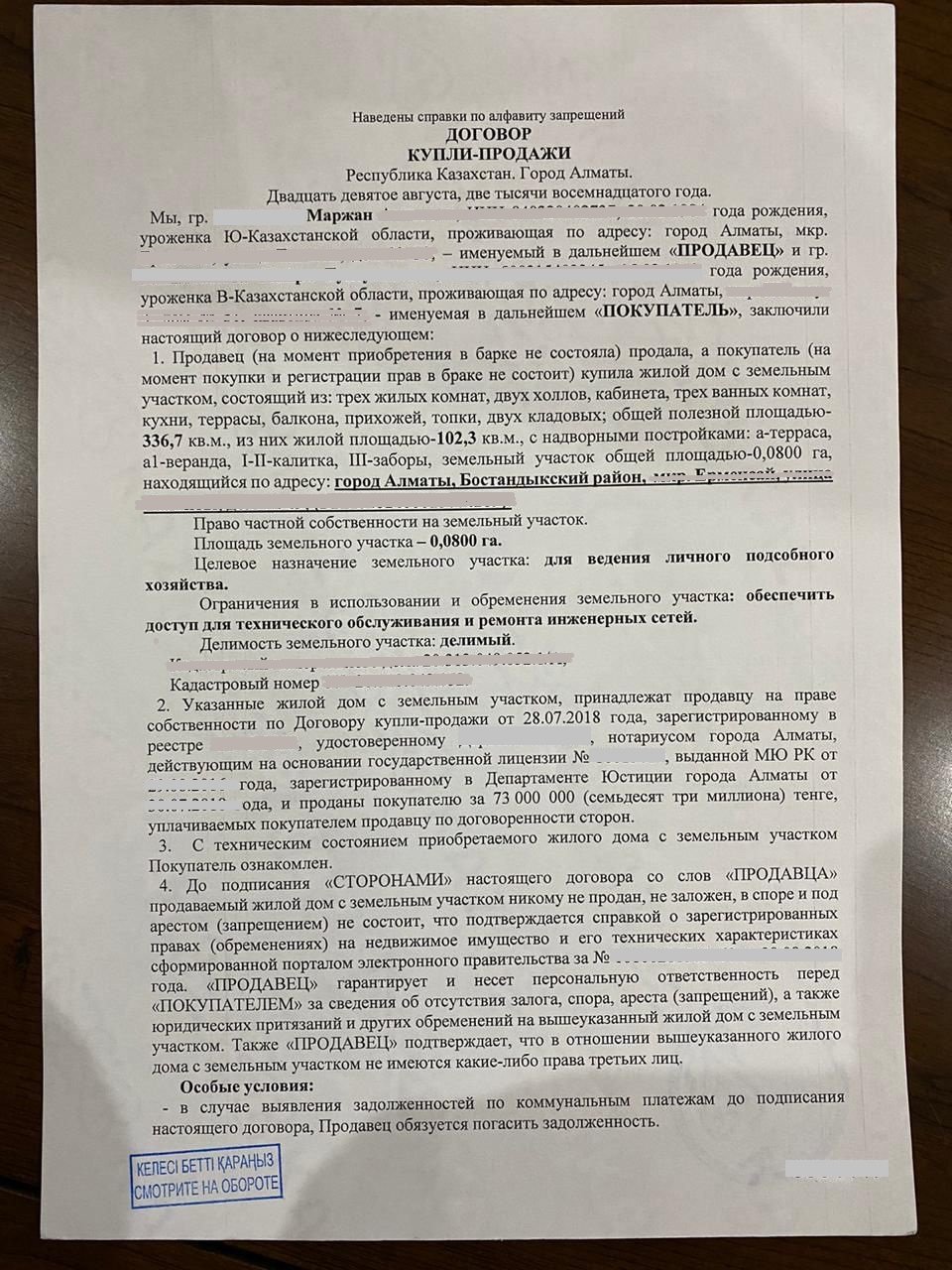
Everything after that was simple. As long as payments and interest were being made, everything was fine. As soon as the victims tried to settle the entire loan, the problems began.
They took the money and then told us that our property now belonged to them, Nazira says.
Thus, Rita Uteuova is described as a loan shark, Adlet Rakhimzhanov as an intermediary who also took money, interest, and property, and Sergey Denisov is seen by the victims as the businessman who registered other people’s property under his own name and those of his relatives.
This is what the plaintiffs have been trying to prove for five years. They describe the actions of the accused and the suspect as illegal because:
- They were private loan sharks with no licenses or permits, violating lending laws and not paying taxes while conducting illegal business activity in the country.
- Using their contacts in banks and MFOs, they gained access to clients’ confidential information and tricked them into taking loans.
- They formalized these deals as property sale agreements with exploitative terms, including more than 90 percent annual interest. But even after full repayment, they did not return the property.
Three victims shared their losses in numbers:
- Nazira borrowed 48,000 dollars. She repaid everything: 98,000 dollars with interest. She lost her apartment and house worth 175,000 dollars.
- Irina Antropova received 45,000 dollars from the loan sharks. She repaid only part of it: 4,200 dollars. All her property was taken and sold, presumably for 128,000 dollars. Irina was not returned the difference.
- Marzhan borrowed 126,000 dollars from the loan sharks. She repaid everything: 190,000 dollars with interest. Her property worth 320 million tenge (more than 600,000 dollars) was taken.
Five Years
When the victims lost everything, they first went to civil courts. Two won and got their property back. The others lost, and they were evicted from their homes.
In 2020, they filed complaints with the police, but criminal proceedings were refused. Only after sending a collective letter to the president was the case opened.
However, the investigation repeatedly stalled. Prosecutors were replaced three times, investigators six times. The case was closed twice.
The victims flew to Astana 14 times a year. They filed complaints with the General Prosecutor’s Office, the Ministry of Internal Affairs, and the presidential administration about the closure of the case.
Each time, the case was reopened and returned for further investigation.
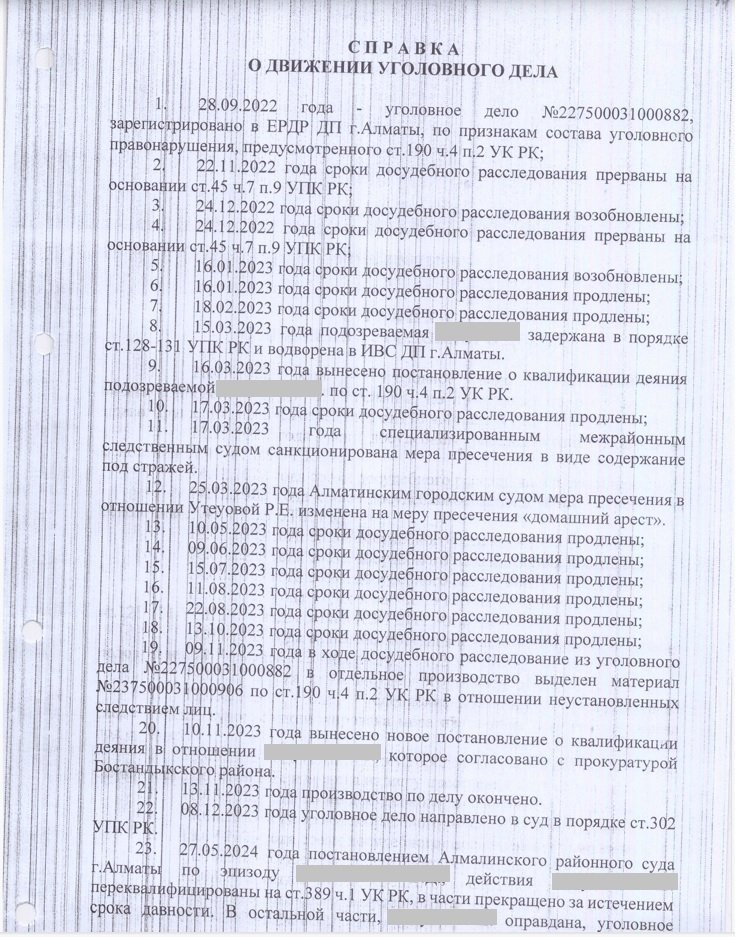
Interesting Facts
A wiretap was placed on suspect Rakhimzhanov’s phone. It revealed that a court chair called Rakhimzhanov and asked him for money.
This was officially recorded and announced in court.
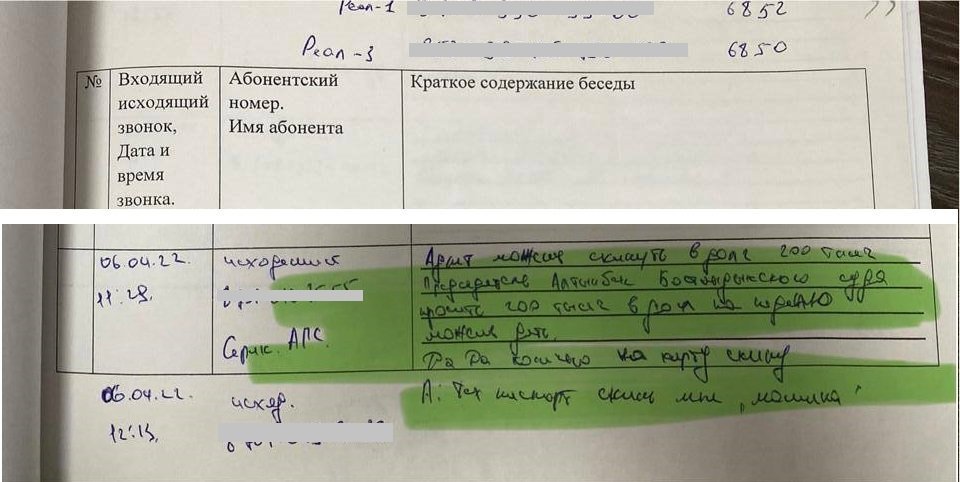
When the case was closed yet again, Irina Antropova cut her wrists outside the prosecutor’s office, and later twice attempted to set herself on fire outside the prosecutor’s and police buildings in Almaty.
The main suspect, Adlet Rakhimzhanov, boarded a flight to the Emirates on October 6, 2024, and has not returned to Kazakhstan. He was declared wanted only two months later — on December 11, 2024, by coincidence, exactly at the time when no property remained registered under his name.
Interpol located him in the UAE on February 13, 2025, but Rakhimzhanov still has not been extradited, and the trial is taking place without him.
Nazira lost her apartment and house. Marzhan lost six properties and now has no home. She has been diagnosed with a brain tumor.
Irina Antropova and her husband are pensioners. They lost their house, shop, and apartment, and in 2024, one month after giving birth, their 25-year-old daughter died. Now the pensioners live with their one-year-old granddaughter in a dormitory made of metal containers.



The developer connected the containers, painted them on the outside, and finished the interiors. From the outside, it looks like a normal two-story residential building. But inside, due to moisture, salt exposure, and lack of ventilation, the metal is corroding.
The floor has collapsed, the ceilings have holes, and there is no radiator in the small bedroom.
Irina does not receive her pension due to bureaucratic problems, an expired ID, and lack of money to pay fines.
Requests Made
Fifteen women are now representing themselves without lawyers, defending their property, and deeply doubting that all those responsible will be punished.
We think only one person will be convicted. But we demand that everyone involved be punished under the article ‘Fraud,’ including the unextradited and untried suspect Adlet Rakhimzhanov. We want our homes, money, and businesses returned. And we will continue fighting if we do not find justice in this court, the victims say.
Original Author: Dina Ismagambetova
Latest news
- Major Fraud Case: Almaty Trial Targets Group Accused of Taking Homes from 30 Families
- Toqayev Removes Dozens of Judges Amid Ethics and Corruption Violations
- Aigul Sailybayeva: Deputy Interior Minister Confirms Parallel Probe Into Torture
- Kazakhstan: Atomic Energy Agency Deputy Chair Says Uranium Reserves Enough for Future Nuclear Plants
- What We Know So Far About the Arrest of Kazakh Military Attaché's Assistant in Poland
- Who Really Profits From Kazakhstan’s Oil?
- Karakalpak Activist Muratbai, Now Safe Abroad, Reveals His Next Steps
- Kazakhstan: Senate Approves New Rules for Moving Radioactive Cargo Across CIS
- Ukraine: Ministers Step Down Amid Expanding Energoatom Corruption Probe
- Kazakhtelecom Responds to Mangystau Employees’ Complaint Over Low Wages
- Gold Mining Company Abandons Deposit in Almaty Region
- Why It’s Too Early to Close the Case on the Bek Air Plane Crash
- Toqayev and Putin Hold Talks at The Kremlin
- Uzbekistan Establishes U.S.-Uzbekistan Business Council Led by President’s Daughter
- Could U.S. Sanctions on Lukoil Open Opportunities for Kazakhstan in Bulgaria?
- Kazakhstan Joins Abraham Accords: What the Agreements Mean and Why They Matter
- Vice Defense Minister Addresses Protest by Mothers
- Khromtau Akim Detained on Bribery Charges
- Supreme Audit Chamber Uncovers Misuse of Sports Funds and Disciplinary Violations
- Court Rules Against Zhezkazgan-Air in Antitrust Case

